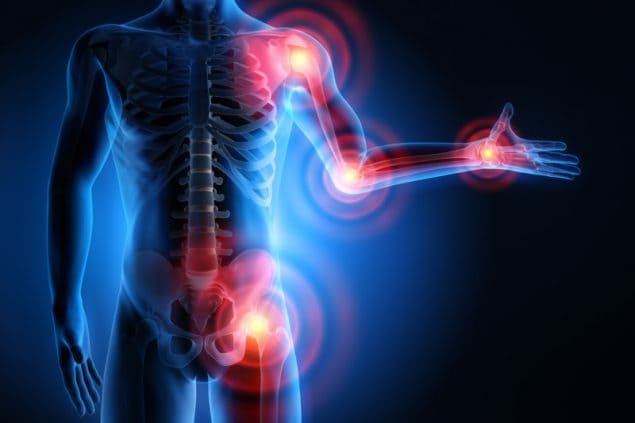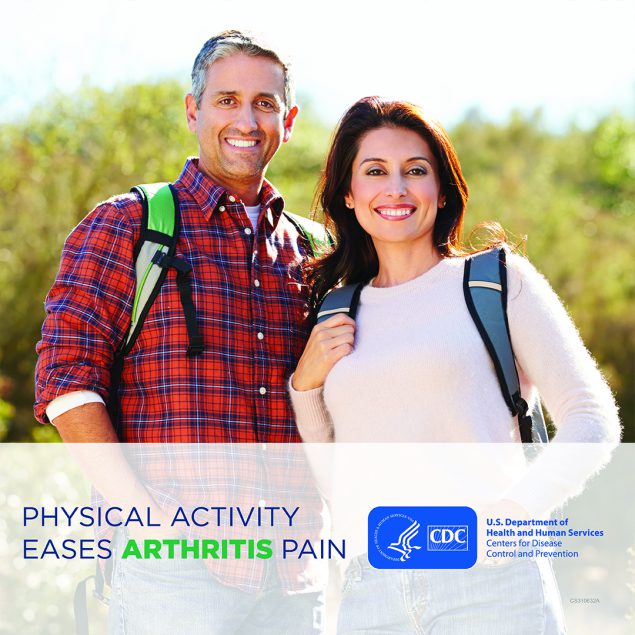Four Things You Should Know About Arthritis
CDC aims to raise awareness about the impact of arthritis. Join the movement by checking out this list of four important facts and sharing it with your family, friends, and providers.
Arthritis is more common than you may think. Globally, millions of people are affected by arthritis. In the US, about 1 in 5 adults have arthritis that has been diagnosed by a doctor1. Arthritis can lead to severe joint pain, thereby limiting the activities people normally do in their everyday lives. This can affect their mental health and ability to work and participate in beneficial physical activity. These four facts about arthritis provide information and resources to help support adults with arthritis, as well as their caregivers and providers.

Arthritis affects the joints, tissues around the joint, and other connective tissues. It commonly occurs in the hands, hips, and knees.
1. Arthritis is not just limited to older adults.
While arthritis is more common among older adults, arthritis develops in younger people too1:
- Among children and adolescents <18 years of age, approximately 220,000 had arthritis during 2017–2021.
- Among adults aged 65 and older, 47% report ever having been diagnosed with arthritis.
- Among adults aged 45 to 65 years, 26% report ever having been diagnosed with arthritis.
- Among adults aged 18 to 45 years, 5% report ever having been diagnosed with arthritis.

In terms of numbers, however, the majority of US adults with arthritis—52% —are of working age (18-64 years) and may experience activity limitations that affect their ability to work.
Perhaps lesser known is the fact that arthritis can also develop in children under 18 years. Prevalence increased with age and was highest among those aged 12–17 years, non-Hispanic Black or African American children and adolescents, children and adolescents with anxiety or depression, those who were physically inactive, had overweight or a heart condition, or lived in a food-insecure or smoking household. The symptoms of childhood arthritis may come and go and are similar to those in adults. While there is no cure for childhood arthritis, some children with arthritis achieve permanent remission. This means the disease is no longer active, but any permanent damage to the joints will remain. Early diagnosis and proper treatment are important to prevent or minimize permanent damage.
2. Certain risk factors increase your chances of developing arthritis.
Some behaviors and characteristics, called risk factors, increase an adult’s likelihood of getting certain types of arthritis or making it worse. Risk factors that you cannot control include:
- Genetics or inherited traits.
- Age.
- Sex.
Risk factors that are within your control to change include:
- Extra weight.
- Joint injury or overuse.
- Job or occupation.
- Infection.
- Smoking.
By making certain lifestyle changes like eating healthier and becoming more physically active, you can decrease your risk of getting or worsening arthritis. Visit the Risk Factors page to find out more about what you can do to lower your risk of arthritis.
3. Joint-friendly physical activity is beneficial for people with arthritis.
If you have arthritis, joint-friendly physical activity is one of the most effective ways to manage your symptoms. It’s also a great option for arthritis management without medications or in addition to medications that are carefully monitored by your doctor. Walking, gardening, dancing, and swimming are some examples of joint-friendly activities.
Benefits of physical activity for people with arthritis include:
- Decreased pain.
- Improved range of motion and function.
- Increased energy.
- Improved mood.
- Weight loss and weight maintenance.
- Prevention or improvement of other chronic (long-lasting) conditions, like diabetes and heart disease.
When starting or increasing physical activity, it’s normal to have some pain, stiffness, and swelling for the first 6 to 8 weeks. Nonetheless, sticking with your activity plan can help you form healthy habits and achieve long-term pain relief. Modify your plan as needed and try these other tips to minimize pain while your joints adjust to the new activity.
Virtual and community-based physical activity programs offer structured guidance on how participants can safely engage in physical activity, create action plans, and overcome obstacles.

Adults with arthritis should aim to get at least 150 minutes of moderate-intensity physical activity a week. However, stay as active as your health allows. Remember that some physical activity is better than none!
4. Self-management is important for taking control of your arthritis.
Maybe you’ve heard of self-love or self-care, but what is self-management? Self-management is what you do day-to-day to manage your condition and stay healthy. It’s the ability to take control of one’s own health by tracking symptoms, making healthy choices, going to appointments with health care providers, and seeking help from loved ones or professionals on tasks that are challenging or require expert recommendations.
Self-management involves learning strategies to cope with the physical and emotional challenges of living with a chronic disease. Self-management education workshops empower participants with strategies, skills, and confidence to manage their chronic disease and live healthier lives. These workshops can help participants with arthritis:
- Manage pain and other symptoms.
- Reduce stress.
- Improve mood.
- Communicate better with family, friends, and healthcare providers.
- Make lifestyle changes about food and physical activity.
Check out these 5 Ways To Manage Arthritis to learn more about what you can do to take care of your arthritis and wellbeing.
- Fallon EA, Boring MA, Foster AL, et al. Prevalence of diagnosed arthritis—United States, 2019–2021. MMWR Morb Mortal Wkly Rep 2023;72:1101–1107. http://dx.doi.org/10.15585/mmwr.mm7241a1